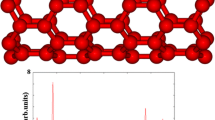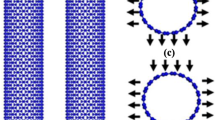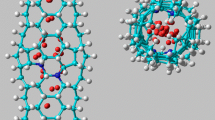Abstract
The physisorption of molecular hydrogen (H2) in Stone–Wales defected single-walled carbon nanotubes (D-SWCNTs) is investigated using molecular dynamics simulations (MDS). The interatomic and pairwise interactions between atoms and molecules are described by the AIREBO and Lennard–Jones (LJ) potentials. The effects of defect concentration, temperature, and pressure on hydrogen adsorption metrics have been thoroughly investigated. The findings reveal that (1) the existence of defective sites has a considerable impact on the gravimetric H2 uptake of large-sized D-SWCNTs and (2) only a trivial difference in hydrogen adsorption is observed on increasing the defect concentration. However, the hydrogen storage capacity of D-SWCNTs exhibits a noticeable advantage over that of pristine SWCNTs as temperature decreases. The maximum H2 uptake of D-SWCNTs is 9.11 and 1.33 wt% at 77 and 300 K, respectively. Besides, as compared to the requirement for reversible adsorption kinetics, the average binding energy of H2 molecule in D-SWCNTs is quite low. The average binding energy ranges from 0.021 to 0.052 eV. While the adsorption capacity increases with increasing defect concentration, the mechanical stability of SWCNTs decreases, preventing the utilization of nanotubes for hydrogen storage with a higher defect concentration. We expect that the current studies will encourage researchers to put more effort into efficiently utilizing large-sized D-SWCNTs as a potential hydrogen storage medium.
Access this chapter
Tax calculation will be finalised at checkout
Purchases are for personal use only
Similar content being viewed by others
References
Tarhan C, Çil MA (2021) A study on hydrogen, the clean energy of the future: hydrogen storage methods. J Energy Storage 40:102676
Moradi R, Groth KM (2019) Hydrogen storage and delivery: review of the state of the art technologies and risk and reliability analysis. Int J Hydrogen Energy 44:12254–12269
Mishra S, Luhadiya N, Kundalwal SI (2023) Atomistic insights into the H2 adsorption and desorption behavior of novel Li-functionalized polycrystalline CNTs. Carbon 207:23–35
Lyu J, Kudiiarov V, Lider A (2020) An overview of the recent progress in modifications of carbon nanotubes for hydrogen adsorption. Nanomaterials 10:100217
Bhatt MD, Kim H, Kim G (2022) Various defects in graphene: a review. RSC Adv 12:21520–21547
Lugo G, Cuesta IG, Sánchez Marín J, Sánchez de Merás A (2016) MP2 study of physisorption of molecular hydrogen onto defective nanotubes: cooperative effect in stone–wales defects. J Phys Chem A 120:4951–4960
Mishra S, Kundalwal SI (2022) Topological defects embedded large-sized single-walled carbon nanotubes for hydrogen storage: a molecular dynamics study. Int J Hydrogen Energy 47:36605–36621
Luhadiya N, Kundalwal SI, Sahu SK (2021) Investigation of hydrogen adsorption behavior of graphene under varied conditions using a novel energy-centered method. Carbon Lett 31:655–666
Author information
Authors and Affiliations
Corresponding author
Editor information
Editors and Affiliations
Rights and permissions
Copyright information
© 2023 The Author(s), under exclusive license to Springer Nature Singapore Pte Ltd.
About this paper
Cite this paper
Mishra, S., Kundalwal, S.I. (2023). Molecular Hydrogen Storage in Stone–Wales Defected Single-Walled Carbon Nanotubes Using Molecular Dynamics Simulation. In: Khan, Z.H., Jackson, M., Salah, N.A. (eds) Recent Advances in Nanotechnology. ICNOC 2022. Springer Proceedings in Materials, vol 28. Springer, Singapore. https://doi.org/10.1007/978-981-99-4685-3_33
Download citation
DOI: https://doi.org/10.1007/978-981-99-4685-3_33
Published:
Publisher Name: Springer, Singapore
Print ISBN: 978-981-99-4684-6
Online ISBN: 978-981-99-4685-3
eBook Packages: Chemistry and Materials ScienceChemistry and Material Science (R0)




